|
|
|
Sort Order |
|
|
|
Items / Page
|
|
|
|
|
|
|
| Srl | Item |
| 1 |
ID:
132531


|
|
|
|
|
| Publication |
2014.
|
| Summary/Abstract |
Afghanistan has been the global epicenter of heroin production for the past decade. Heroin networks and drug lords present a principal impediment to security, state building, and democratic governance. Beyond the national boundaries, Afghan-originated heroin creates enormous challenges for international security by financing terrorism, instigating corruption, killing nearly 100,000 users worldwide every year, undermining public order, and debilitating economic development. The devastating impacts of the Afghan heroin trade have spilled over into Southwest Asia, Central Asia, Russia, China, the Balkans, and Europe. Because Turkey stands on the shortest transit pathway between Southwest Asia and Europe, it is intensively exposed to illicit flows of Afghan heroin along the Balkan Route. Transnational crime syndicates have been exploiting Turkish territories for decades for the purpose of trafficking heroin to European markets. This paper discusses Afghan heroin as an international security conundrum. It further seeks to explore the dimensions of the threat in Turkey, new patterns in heroin trafficking, and profiles and operation modes of transnational syndicates. The analyses are based upon the scrutiny of important case files, national seizure database, and annual KOM provincial questionnaires. In conclusion, the paper puts forward policy recommendations for security elites both in Turkey and in other states affected by the illicit trade of Afghan heroin.
|
|
|
|
|
|
|
|
|
|
|
|
|
|
|
|
| 2 |
ID:
092211
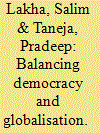

|
|
|
|
|
| Publication |
2009.
|
| Summary/Abstract |
Contemporary globalisation is viewed both as offering immense opportunities and posing a fundamental threat to the nation-state and democratic governance. To the proponents of globalisation, integration into the world economy through liberalisation of foreign trade and capital flows, combined with deregulation of the national economy, promises greater economic efficiency, higher consumption levels and generally improved living standards. For them, state intervention in the economy aimed at restricting the free play of market forces is dysfunctional, resulting in lower social and economic benefits for the population at large. Within this optimistic perspective, globalisation is thought likely to 'flatten' economic differences between nations1 and lead to a 'borderless world',2 where the barriers to flows of capital, technology, and information will be minimised if not totally removed.
|
|
|
|
|
|
|
|
|
|
|
|
|
|
|
|
| 3 |
ID:
094957
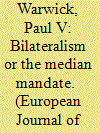

|
|
|
|
|
| Publication |
2010.
|
| Summary/Abstract |
Michael McDonald and Ian Budge have recently advanced an interpretation of democratic governance based on what they term the 'median mandate'. This perspective locates the key element of liberal democracy in a close correspondence between government policy and the policy preferences of the median voter on the left-right scale. The cross-national evidence they produce in favour of this interpretation is impressive, but it largely hinges on a method for measuring the median voter position in each election that relies on the positions of the various parties in the election and the vote shares they received. This article examines the validity of the median mandate hypothesis when median positions are measured more directly from public opinion surveys (particularly, the Eurobarometer and Comparative Study of Electoral Systems series). The findings show that choice between distinct alternatives, rather than conformity to the median, more accurately characterises governance in democratic systems.
|
|
|
|
|
|
|
|
|
|
|
|
|
|
|
|
| 4 |
ID:
132887
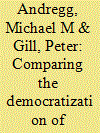

|
|
|
|
|
| Publication |
2014.
|
| Summary/Abstract |
This introductory article discusses some of the main themes that are contained within this collection originally delivered as papers to two conferences. There is brief consideration of some issues of method and major themes relating to the legacy of authoritarian regimes, the process of change and the current state of 'democracy' are identified. Continuing controversies and uncertainties around intelligence have important implications for democratic governance in many countries which must encourage more comparative work in this key area of intelligence studies.
|
|
|
|
|
|
|
|
|
|
|
|
|
|
|
|
| 5 |
ID:
089518
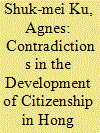

|
|
|
|
|
| Publication |
2009.
|
| Summary/Abstract |
This article discusses the trajectory of citizenship (re-)formation in relation to governance strategies in Hong Kong. Extending Marshall's theory with a notion of democratic citizenship, it shows how the governance strategies become increasingly inadequate and how civil society's new proposals outgrow the conventional model of citizenship.
|
|
|
|
|
|
|
|
|
|
|
|
|
|
|
|
| 6 |
ID:
095586
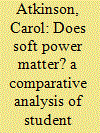

|
|
|
|
|
| Publication |
2010.
|
| Summary/Abstract |
Democratic governance depends not only on the building of democratic institutions but also on citizens' knowledge about how these institutions should function in their everyday lives. I argue that US-hosted educational exchange programs are one mechanism whereby citizens of nondemocratic states might experience life firsthand in a democratic country. Their experiences may impact the political institutions and influence political behavior in their home countries. In order for this process to take place, I argue that at least three contextual conditions are important: (i) the depth and extent of social interactions that occur while abroad, (ii) the sharing of a sense of community or common identity between participants and their hosts, and (iii) the attainment of a politically influential position by the exchange participant when they return home. In this article, I test these hypotheses and find support for what advocates of soft power often contend: US-hosted exchange programs can play an important role in the diffusion of liberal values and practices across the borders of authoritarian states.
|
|
|
|
|
|
|
|
|
|
|
|
|
|
|
|
| 7 |
ID:
183893
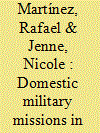

|
|
|
|
|
| Summary/Abstract |
Latin American militaries are today in many regards inoperative and obsolete as an instrument of defence. Yet, they seek to maintain their organisational power and privileges. Governments, on the other hand, lack the adequate means to fight criminality, persisting poverty and social inequality. In an apparent win-win situation, Latin American governments have used the military as a wildcard to step in where civilian state capacity falls short, including for urban and border patrols, literacy campaigns and to collect garbage, among many other tasks. The military's manifold internal use has been defended mainly based on pragmatic reasons. We argue instead that the ostensive pareto optimality between militaries and governments has had negative effects for civil-military relations from a democratic governance point of view that takes into consideration the efficiency and effectiveness of how the state delivers basic services across different policy areas.
|
|
|
|
|
|
|
|
|
|
|
|
|
|
|
|
| 8 |
ID:
133752
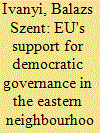

|
|
|
|
|
| Publication |
2014.
|
| Summary/Abstract |
The European Union seems to place an increasing rhetorical emphasis on harnessing the transition experience of the new member states. This article examines whether the EU actually makes use of this experience in its promotion of democratic governance in the eastern neighbourhood. The main conclusion is that while reform priorities of the EU in the region are aligned with transition experience, the actual participation of actors from the new members in implementing EU-financed projects aimed at promoting democratic governance is limited. This contradiction should be resolved or it will further erode the credibility of the EU's external policies.
|
|
|
|
|
|
|
|
|
|
|
|
|
|
|
|
| 9 |
ID:
113354
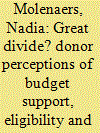

|
|
|
|
|
| Publication |
2012.
|
| Summary/Abstract |
Budget Support (bs) has been considered the aid modality that best realises the Paris Declaration principles of alignment, harmonisation and respect for recipient ownership. In design the modality has a very strong technocratic focus, and the oecd/dac has endorsed the idea that bs should be delinked from broader political concerns. In reality, however, donors do use bs to leverage more and better democratic governance. This political use of bs is not limited to exceptional moments when the political situation seriously deteriorates in certain countries. This article shows that such use is grounded in fundamentally different visions and policies that donors hold regarding the scope of leverage for bs. Such starkly diverging interpretations of which reforms bs can 'buy' undermine the objectives the modality was designed to achieve.
|
|
|
|
|
|
|
|
|
|
|
|
|
|
|
|
| 10 |
ID:
132545
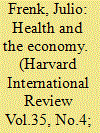

|
|
|
|
|
| Publication |
2014.
|
| Summary/Abstract |
W e are at a critical juncture in efforts to promote development around the world. If we are to meet the challenges of our times we need new forms of thinking and acting. The key to deal with a changing and increasingly complex reality is integration, and the starting point for integration is the acknowledgment of the crucial notion that social and economic policy are really two sides of the same coin. The recent evolution of global health epitomizes this idea. Indeed, many observers have remarked that the past decade can be seen as a new era in global health. The most important feature of this is the fact that health matters have stopped being the exclusive concern of domain experts. Instead, health has come to occupy a central place in the most pressing dimensions of the global agenda: economic development, national security, democratic governance, and human rights. In this context
|
|
|
|
|
|
|
|
|
|
|
|
|
|
|
|
| 11 |
ID:
118877
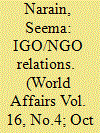

|
|
|
| 12 |
ID:
157771
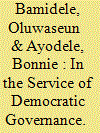

|
|
|
|
|
| Summary/Abstract |
For the crafters and drafters of the African Union’s (AU) Constitutive Acts particularly the Addis Ababa Charter and the Lomé Declaration of July 2000 and the Economic Community of West African States’ (ECOWAS) Protocol on Good Governance and Democracy, the novel idea was to provide a regional, sub-regional, platform of support to democratic governments and also deter any forms of unconstitutionalism. However, recent events have put to the test the political capacity of these organisations to uphold the sanctity of the normative framework and the protocol supportive of democratic processes. In the case of the AU, the outburst of revolutionary movements in the north African region provided a platform for a thorough assessment of the AU’s Normative Frameworks related to constitutionalism and democracy. While it was accepted that the case of Tunisia followed the democratic process, the Egyptian and Libyan cases were seen as a negation of the principles of the framework.Likewise,in the case of the ECOWAS, there were myriads of problems that tested the organisation’s democratic credentials. For instance, Guinea Bissau experienced two coup d’états in two years (2009 and 2012), Guinea in December 2008; Niger in March 2010; and Burkina Faso in 2015. The AU and ECOWAS have been challenged and pulled along by two parallel but not equal forces: the need to ensure respect for the principle of total rejection of unconstitutional changes of government, and the necessity to recognise the reality on the ground. This study therefore employs both historical and comparative methodologies to assess the roles of these organisations in being true to the values of democracy as contained in their normative framework and the protocol, as well asalso examines the challenges faced in the context of the situations in Libya, Mali and Guinea Bissau.
|
|
|
|
|
|
|
|
|
|
|
|
|
|
|
|
| 13 |
ID:
120167
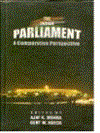

|
|
|
|
|
| Publication |
New Delhi, Konark Publishers Pvt Ltd, 2003.
|
| Description |
xxxvi,459p.hbk
|
| Standard Number |
812200654X
|
|
|
|
|
|
|
|
|
|
|
|
Copies: C:1/I:0,R:0,Q:0
Circulation
| Accession# | Call# | Current Location | Status | Policy | Location |
| 057242 | 328.54/MEH 057242 | Main | On Shelf | General | |
|
|
|
|
| 14 |
ID:
112611
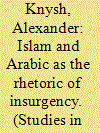

|
|
|
|
|
| Publication |
2012.
|
| Summary/Abstract |
Interpretations and uses of Islam are legion today. Some call for improving or preserving the morals and dignity of a certain local Muslim community or of the global Muslim community (umma) in its entirety. Others are eager to demonstrate that Islam is fully compatible and, in fact, conducive to modernity, democratic governance, and technological advancement of humankind. Still others posit Islam as a powerful means of liberation from occupation and domination/exploitation of Muslims around the world by non-Muslim powers. 1
This article addresses one concrete example of how some Muslim insurgents of the Northern Caucasus use Islam to unite the diverse and occasionally mutually hostile ethnic groups of the area in the face of Russian domination with the goal of establishing an independent Islamic state based on the Muslim Divine Law (Sharia). After providing a general overview of the history and ideology of this Islamic/Islamist movement, the article focuses on the ways in which its leadership uses the Internet to disseminate its understanding of Islam and to rally young Muslims round the idea of the trans-ethnic Sharia state that they promise to institute after defeating and expelling "the Russian occupiers" and their local backers. Special attention will be given to the role of Islamic concepts and taxonomies as well as the Arabic language in framing the political grammar of the insurgency movement known as "The Caucasus Emirate.
|
|
|
|
|
|
|
|
|
|
|
|
|
|
|
|
| 15 |
ID:
194923


|
|
|
|
|
| Publication |
New Delhi, Vitasta Publishing Pvt Ltd, 2024.
|
| Description |
xxiv, 196p.: figures, tablespbk
|
| Standard Number |
9788119670130
|
|
|
|
|
|
|
|
|
|
|
|
Copies: C:1/I:0,R:0,Q:0
Circulation
| Accession# | Call# | Current Location | Status | Policy | Location |
| 060582 | 320.546/JEH 060582 | Main | On Shelf | General | |
|
|
|
|
| 16 |
ID:
092508
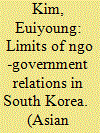

|
|
|
| 17 |
ID:
154959
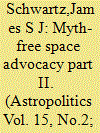

|
|
|
|
|
| Summary/Abstract |
Space advocates commonly compare the settling of the “space frontier” to the settling of the “western frontier” in the United States, arguing that space settlement will realize the same benefits purportedly realized by the western expansion of the United States: the generation of new cultures; the development of new technologies; and the empowerment of democratic governance. However, much of the reasoning here is based on a faulty understanding of history and on an overly optimistic view of what it will be like to live in a space settlement. Thus, I argue that ardent faith in the promises of settling the space frontier is a mythological belief, rather than a well-confirmed one.
|
|
|
|
|
|
|
|
|
|
|
|
|
|
|
|
| 18 |
ID:
128827
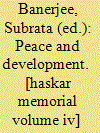

|
|
|
|
|
| Publication |
Chandigarh, Centre for Research in Rural and Industrial Development (CRRID), 2007.
|
| Description |
x, 483p.Hbk
|
| Contents |
Papers presented at the 5th Haskar memorial seminar-cum-lecture series on peace and development organized by CRRID from 4-11 November 2006
|
| Standard Number |
8185835527
|
|
|
|
|
|
|
|
|
|
|
|
Copies: C:1/I:0,R:0,Q:0
Circulation
| Accession# | Call# | Current Location | Status | Policy | Location |
| 057641 | 338.9/BAN 057641 | Main | On Shelf | General | |
|
|
|
|
| 19 |
ID:
090914
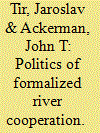

|
|
|
|
|
| Publication |
2009.
|
| Summary/Abstract |
While much of the extant literature has focused on the potential of international rivers to generate militarized conflict, this study builds on more recent works that examine the politics of river cooperation. The article focuses on the efforts to regulate the use of international rivers formally by the means of treaties. The theoretical framework incorporates prominent variables from the (neo)realist and neo-liberal schools of thought as well as the need for potable water and river-related geographic factors. The framework is used to generate expectations about whether riparian countries will enter into the treaties dealing in particular with the issues of water quantity and quality. Systematic empirical evaluations covering the entire world in the 1948-2000 time period confirm some while challenging much of the conventional wisdom on the topic. Specifically, preponderant power distribution, economic interdependence, democratic governance, and water scarcity all increase the chances for formalized river cooperation between contiguous riparian states. In contrast, the findings suggest that the roles of allegedly important and problematic factors such as the upstream/downstream relationship and recent militarized conflict have been exaggerated in earlier research. Cumulatively, the findings sound a cautiously optimistic note for the prospects of the spread of formal river cooperation in the less developed parts of the world.
|
|
|
|
|
|
|
|
|
|
|
|
|
|
|
|
| 20 |
ID:
111733
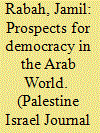

|
|
|
|
|
| Publication |
2012.
|
| Summary/Abstract |
Since the beginning of this year, tangible changes have occurred either directly with the overthrow of the regimes in Tunisia, Egypt and Libya, or indirectly as was the case in Morocco and Jordan, where anger was absorbed through some reforms. However, the causes of this were neither new nor accidental. Discontent with Arab regimes has always been present and widespread within liberal and Islamic circles, albeit for different and divergent reasons.
|
|
|
|
|
|
|
|
|
|
|
|
|
|
|
|
|
|
|
|
|